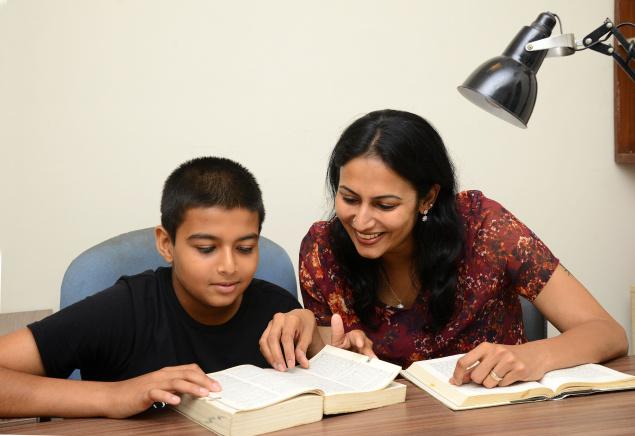Learn at home

In a city where education is considered the first pillar,
RAVEENA JOSEPH finds that the concept of homeschooling seems to be catching up.
A few talk about its pros and cons
School
often brings back fond memories. More often than not, none of them involve the
rebukes of strict teachers, the pressure of exams or the panic that precedes
assignments and seminars. As schools steadily amp up the load, parents all over
the country are slowly looking at alternate options to break free from the
rigid structures of the educational system.
“Learning
is not something that happens at a particular place, in a particular way,” says
Priya Desikan who turned to homeschooling five years ago. Her son, Raghav,
disliked school. There were restrictions on what he was allowed to eat, who he
could be friends with and what skills he had to master. At the age of four,
even before he’d seen enough of it, Raghav found the system too rigid and
stifling. He wanted more flexibility and freedom, but the school expected him
to fit into the mould they’d cast for the thousand others they educate.
Now, a
little over nine years, Raghav is no longer the shy and withdrawn child his
teachers claimed he was. He’s self-assured, and has taken charge of his own
education. “He knows what he wants to learn, why and when. Also, how much he
wants to delve into each subject,” says Priya, who trusts her child and
believes in having open, honest conversations with him regarding his
education.
“Children
are naturally curious and they constantly want to understand things,” says
Anita Balasubramanian, who wasn’t keen on sending her daughters to school right
from the start. She sent her eldest to a Montessori school, anyway, just so she
could decide for herself, only to have her come back and say she wasn’t ready
to go to school yet. “The school wouldn’t let me observe her in class, and help
her settle into the new environment either,” says Anita. So now, she educates
her children at home, through what they call “life living”. The
Balasubramanians take their daughters wherever they go — be it to work or to
watch a performance — so that they learn through observation and questioning.
Everyday is an opportunity to learn and every activity teaches something.
Though their five-year-old daughter is yet to learn the alphabet series, she
understands gardening, composting, dance, music and more. “I don’t think she’s
missing out on anything,” says Anita.
While
parents move their children away from established structures, they create new
and flexible ones which work for them. Decidedly, there are many challenges to
it and it isn’t for everyone. Children need the time and attention of their
parents, or the financial backing to hire help and tutors. They need to be
occupied and kept away from idling and hours of television.
Yet,
this recent phenomenon is gaining traction as parents are increasingly thinking
about the happiness and individuality of their children. Priya says she’s come
across 30 odd families that have jumped onto the home-schooling bandwagon just
in Chennai, a city that regards education the first pillar. Swashikshan —
Indian Association of Homeschoolers, an online forum for home schoolers from
all over the country, has over 1,000 parents coming together and engaging in
conversation to learn from each other.
Though
these children are missing out on the joys of school life, they get to pass up
on the pressures too. Tough times and trials during school years often forge
and cement friendships between children in the same age group. While Nandita
says that the lack of a peer group was a major concern while deciding to pull
her son out of school, Anita says that school only confined her daughter to
interact with kids her own age; she now has friends who range from toddlers to
thathas. “A child, if they grow up this way, will be a different person than if
they go to everyday school,” says Anita.
Post Your Comments for this News
Related Articles
-
Tips for Teaching Coding in Classroom
2017-06-16 12:39:35
-
How to Prepare for Student Orientation Day
2017-05-18 12:53:05
-
World Day for Cultural Diversity for Dialogue and Development.
2017-05-18 10:27:42
-
Big Data for Big Impact #WTISD-17
2017-05-17 09:28:16



